Customer service +
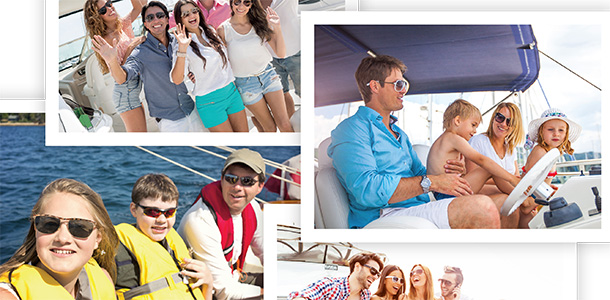
CSI programs offer many benefits for improving business
If there’s one thing most manufacturers and dealers can agree on, it’s the importance of delivering a good customer experience.
Making boating easier is a constant mantra for the industry as it works to improve the experience of buying and owning a boat. We all know the “What are the two best days in a boat owner’s life?” joke.
“We build a product that nobody really has to have, so the easier we can make it for our customers, they’re going to tell their neighbors, they’re going to tell their friends,” said Ann Baldree, vice president at Chaparral and Robalo. “There’s always going to be problems, but it’s how we respond – how quickly we respond and how well we take care of that customer – that defines that customer experience. It’s critical to the future of keeping people in this leisure activity.”
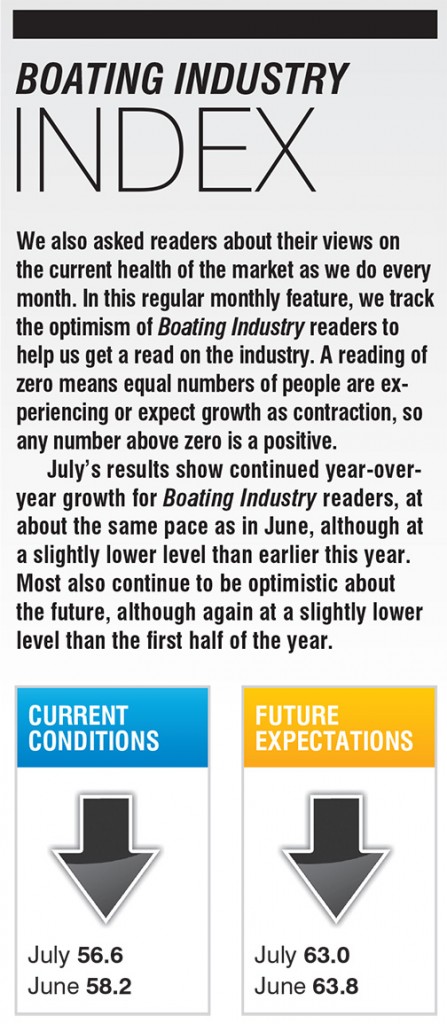 One of the key ways companies can do that is measuring customer satisfaction. After all, you can’t address what you don’t know or track.
One of the key ways companies can do that is measuring customer satisfaction. After all, you can’t address what you don’t know or track.
Most in the industry – about two thirds according to our latest survey – measure their customers’ satisfaction in some way. More than half of those companies use the NMMA CSI program.
That program, now in place for more than a decade, continues to evolve. We talked to several leading manufacturers about how they use the program to improve their company and their customer experience.
We also surveyed the readers of Boating Industry – dealers and manufacturers – about their thoughts on CSI programs to give a wider look at the issue. That survey was conducted via email in late July 2015.
‘Immediate pulse’
One of the most important benefits of regular customer surveys, according to those we talked to, is the ability to quickly identify areas of concern.
That was also the most common benefit cited by Boating Industry readers in our survey. (See the sidebar on p. 36 for a representative sample.)
In the case of the NMMA CSI program, boat and engine buyers receive two surveys: one mailed shortly after delivery and a second about nine months later.
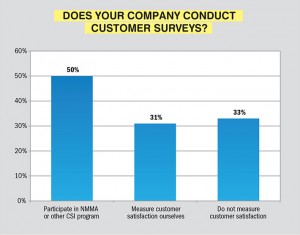
A third-party company, the AVALA Marketing Group, collects and reports the data.
“We get an immediate pulse of the customer experience after the delivery of our boats,” said Donna Giddens, CSI coordinator for Chaparral and Robalo. “We know within 30 days of delivery what the customer experience was at that dealership, with the engine we selected on that boat, all the aspects of our boat that we want to measure.”
That holistic approach to the experience is an important component of the program. It’s about measuring the entire customer experience – recognition that the dealer, the boat and the engine all shape how buyers feel about their purchases.
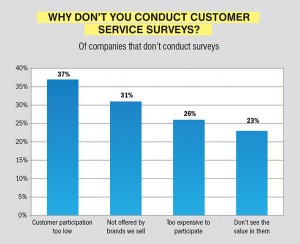
“We have always kept in mind that it is much less expensive for our dealers [and Monterey] to keep a customer than it is to find a new one – a CSI program helps you do that,” said Sue Koehler, customer service coordinator at Monterey Boats.
Of those companies that conduct customer satisfaction surveys, 57 percent said it was very important to them in our survey. Another 22 percent said it was at least somewhat important.
The best companies know they have to embrace customer feedback as an important part of improvement.
“We’ve always believed that listening to our customers, and our dealers for that matter, is the way that we can keep continuing to grow and develop our products and services to meet the ever-changing needs in our marketplace,” said Shelley Tubaugh, vice president of marketing at Grady-White Boats.
Twenty-six years ago, well before the advent of the NMMA program, Grady-White had its own system in place to measure customer satisfaction.
“We’ve always been fortunate to have a very high percentage of returns on our customer surveys and we have always communicated that information back to our dealers,” Tubaugh said. “Before there was ever an NMMA-fostered system we were already reporting that back.”
For many manufacturers, CSI scores have become an important part of their evaluation of dealerships. At Monterey, for instance, the company requires potential new dealers to provide CSI reports from an existing boat or engine manufacturer partner.
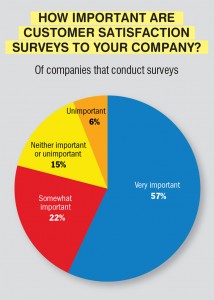
“It gives you an idea of how they operate, because we don’t know them or their business practices 100 percent,” Koehler said.
Many manufacturers hand out their own CSI awards for top-scoring dealers, as well as rewarding dealers that receive good scores with discounts and other benefits.
“We do financially reward the dealers at the end of the year for achieving above 90 CSI,” Baldree said. “That’s money that they can earn to help support the program within their dealership. We provide POP material to the service writers, and customer gifts for answering the survey.”
Other manufacturers base discounts or warranty labor rates partially on CSI scores.
Not all dealers are happy about those types of programs, though, as several mentioned in our survey that they felt they were held responsible for manufacturer defects that weren’t their fault.
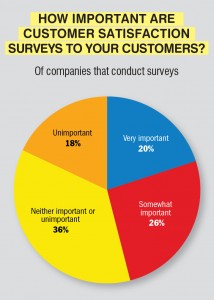
“The factories use [CSI scores] as a hammer to beat up dealers,” said one Nevada dealer. “Most problems are manufacturer-caused problems, not dealer-caused problems.”
In an attempt to address issues like that, Chaparral engages its dealers in the process, giving them full access to the results and working to help them improve.
“We want our dealers to have all the information at their fingertips to improve their business and give their customers a great experience,” Giddens said.
“If we have a dealer that for some reason isn’t achieving their potential on customer service, then we reach out to them and do one-on-one training with them and their staff and their service people to ensure that they understand our commitment to the process,” Baldree added.
Consumer awareness
One of the biggest challenges with the NMMA CSI program – or any such program – is increasing awareness among potential buyers.
Only 20 percent of the respondents in our survey said that customer satisfaction results are very important to their customers, while less than half said they were even somewhat important.
Each year, the program recognizes companies that achieve and maintain an independently measured standard of excellence of 90 percent or higher in initial customer satisfaction, based on the customer surveys. Unlike the now-departed J.D. Power awards, there can be multiple winners in each category if they meet the standards.
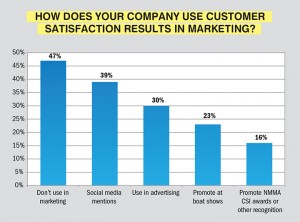
J.D. Power had the advantage of being a recognized brand outside the industry for customer satisfaction, but the NMMA CSI program is working to increase consumer awareness, said Steve Pizzolato, CEO of AVALA Marketing Group, which manages the program for NMMA.
One important change is where the awards will be presented. Traditionally part of the awards at the annual IBEX conference, starting in 2016 they will be handed out at the Miami International Boat Show.
“That’s going to allow us to make a big consumer splash,” Pizzolato said. “We’ll be able to heavily promote the consumer benefits of the program in Miami.”
NMMA also has been running advertisements in the various boat show guides promoting the award winners. Still, there’s work to be done, especially among those new to the industry.
“A new boater might not understand how important it is to have a good organization behind your boat,” Tubaugh said. “A great dealer and manufacturer who are there to provide a terrific ownership experience, including boating activities, clubs and a better overall level of fun with their new boat helps new boaters get the most value for their money. Companies who really listen provide a better experience.”
While some companies look at CSI programs as a potentially negative experience – focusing on the problems with a purchase – that attitude makes for a missed opportunity, Pizzolato said.
“The industry overall has improved its level of satisfaction, but the industry needs to do a better job of focusing in on customers that love what we’re doing – making them brand zealots and brand advocates,” he said. “We’re sitting at 92, 93 percent overall satisfaction. My message would be that maybe getting to 96 percent is unattainable because there are some things about the product that you’re just never going to improve.”
By instead focusing on their raving fans, companies can build positive word of mouth through social media and other outlets.
“So why doesn’t the industry sit back and take the 93 percent of people who love our product and get them to communicate how great boating is?” Pizzolato said. “It’s not a complete change in focus, but an understanding that the program delivers as much information about things gone right as it does things gone wrong.”




